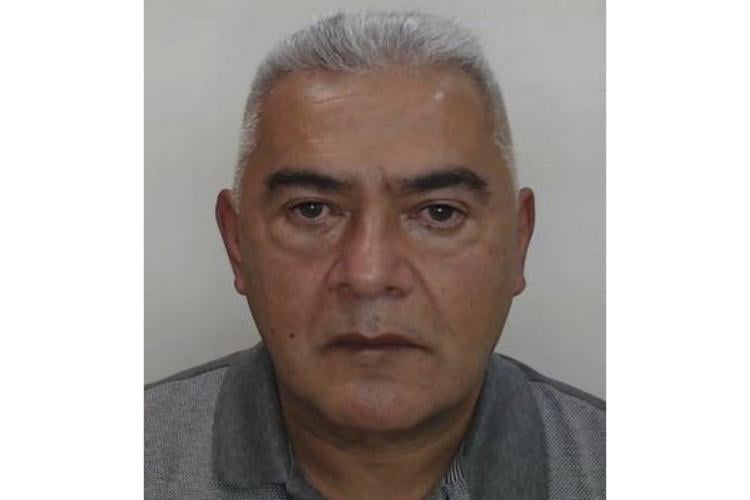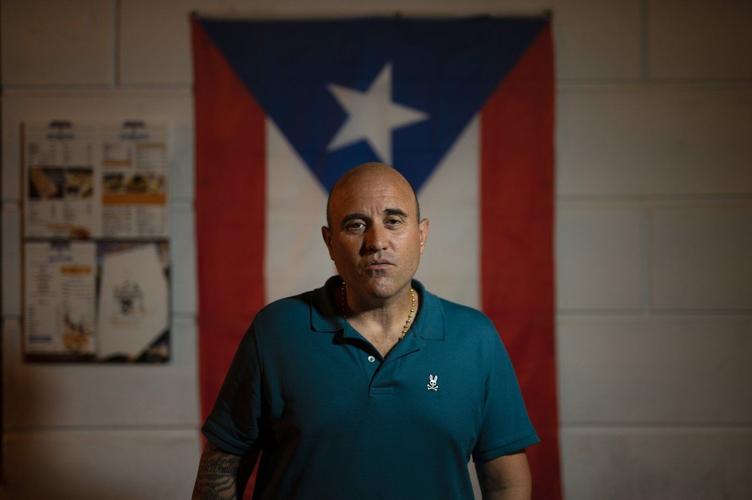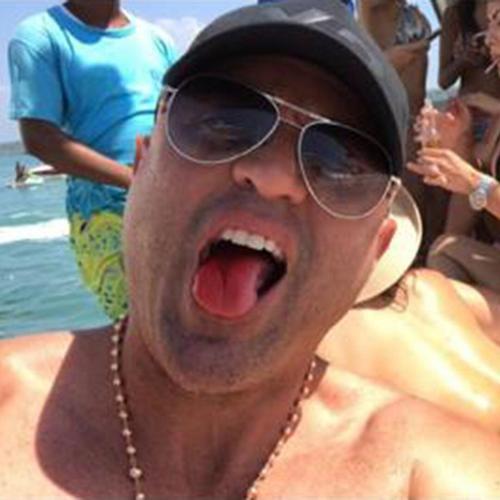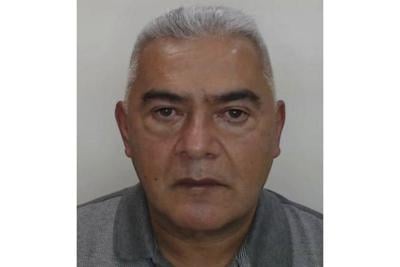MIAMI (AP) ŌĆö In the sordid annals of ColombiaŌĆÖs underworld, Diego Mar├Łn stood out as the ultimate survivor.
Time and again, the reputed henchman for the Cali cartel evaded capture ŌĆö or worse fates ŌĆö as he built a money-laundering network stretching across four continents. He did so, authorities have alleged, with ruthlessness, street smarts and a willingness to bribe a slew of South American police officers and politicians.
All the while, Mar├Łn had an even more powerful ally in his corner: the .
For years, the elite narcotics agency claimed it was investigating the Colombian importer, telling the U.S. Justice Department he was among DEAŌĆÖs top targets. In reality, the relationship was more fraught, with Mar├Łn briefly signed up as an informant even as he with a movable feast of prostitutes, fine dining and expensive gifts, an Associated Press investigation found.
In return, at least one of those agents helped Mar├Łn launder money and smuggle contraband ŌĆö throwing law enforcement off his tracks. As the DEA looked the other way, Mar├ŁnŌĆÖs business flourished into a criminal empire that generated up to $100 million a year, according to the Internal Revenue Service.
The APŌĆÖs findings ŌĆö based on interviews with current and former agents, as well as a trove of highly sensitive Justice Department files ŌĆö offer an unprecedented glimpse into the fraud, shoddy oversight and profligate DEA spending that enabled Mar├ŁnŌĆÖs ascent. The corruption was so extensive, the officials said, that it reminded them of one of the most infamous law enforcement scandals in U.S. history ŌĆö the FBIŌĆÖs unscrupulous dealings with , the Boston mob boss.
ŌĆ£ItŌĆÖs an embarrassment for the DEA,ŌĆØ said retired Colombian Gen. Juan Carlos Buitrago, who spent years trying to take down Mar├Łn only to see his own career derailed by the pursuit. ŌĆ£They ended up creating a monster.ŌĆØ
After decades in the shadows, Mar├Łn has recently become front-page news in Colombia, where he’s been dubbed the ŌĆ£Contraband CzarŌĆØ over that led to his arrest last year in Spain. Among the revelations aired in Colombian media: Mar├Łn provided a private plane and an illegal $125,000 campaign donation to President Gustavo Petro.
Mar├Łn attorneys declined to comment. The DEA did not respond to requests for comment.
The revelations are the for an agency at a crossroads under President Donald Trump. DEA agents already have been redirected to assist in immigration enforcement, and the Justice Department is considering merging the DEA with the Bureau of Alcohol, Tobacco, Firearms and Explosives ŌĆö a restructuring that could change how the U.S. fights the drug war.
ŌĆśU▓į│┘┤Ū│▄│”│¾▓╣▓·▒¶▒ŌĆÖ
Mar├Łn, 62, learned to hustle from an early age. He was raised in Palestina, a western frontier town settled by devout Catholics who eked out a modest existence from the surrounding coffee farms. To help provide for his family, as a kid he sold candies in the townŌĆÖs plaza.
ItŌĆÖs not precisely known how he got into the drug business. But it was sometime during ColombiaŌĆÖs bloody cocaine wars, an era popularized by drug lord Pablo EscobarŌĆÖs infamous phrase of ŌĆ£plata o plomoŌĆØ: money or bullets.
His first brush with the law came in 1993, when he was arrested on accusations of hiding dope money in Colombia-bound home appliances for the leaders of the Cali cartel, , EscobarŌĆÖs main rivals. The evidence, obtained through wiretapped phone calls, tracked with DEAŌĆÖs own intelligence at the time that Mar├Łn was involved in drug trafficking, according to Colombian court records.
Colombian authorities declined to charge him and the case fell apart when a police officer ŌĆö himself later convicted of leaking confidential information to the cartel ŌĆö recanted his testimony against Mar├Łn.
In the ensuing years, the U.S. government records show, Mar├Łn sought to line the pockets of law enforcement. An FBI report from 2020 said Mar├Łn ŌĆ£paid everyone offŌĆØ as he developed a niche in what’s known as trade-based money laundering, of hiding and moving drug proceeds through the use of offshore shell companies and misvalued cargo shipments.
Even as he amassed a fortune, Mar├Łn was careful to eschew the narco bling of infamous drug lords. Few photographs are known to exist of him. He carefully avoided opening bank accounts and limited his electronic communications.
ŌĆ£He was pretty much untouchable,ŌĆØ said Luis Sierra, a longtime U.S. criminal investigator who served as the Homeland Security Investigations attach├® to Bogota. ŌĆ£His tradecraft was compromising and corrupting Colombian ŌĆö and even a few U.S. ŌĆö officials.ŌĆØ
Buitrago, the Colombian general who investigated Mar├Łn, said he obtained reliable intelligence that Mar├Łn had offered $5 million to officials to have him ousted. Buitrago retired rather than accept an unwanted transfer.
ŌĆ£The message was clear: I had to get out of the way or I had to get out of the way,ŌĆØ Buitrago said. ŌĆ£ItŌĆÖs incalculable the number of institutions he co-opted.ŌĆØ
Over time, authorities said, those relationships helped Mar├Łn emerge as a key money launderer to remnants of the defunct Cali cartel.
In that role, they said, contraband he smuggled would end up converted into pesos at ColombiaŌĆÖs ubiquitous ŌĆ£San AndresitosŌĆØ: informal shopping areas packed full of budget-priced electronics and appliances. The name is a play on the Colombian island of San Andres, a duty-free zone in the Caribbean.
That sophisticated system was starting to draw scrutiny from law enforcement when Mar├Łn befriended an impressionable, up-and-coming DEA agent.
The corrupt agent
Special Agent Jos├® Irizarry ŌĆö a former air marshal from Puerto Rico hired by the DEA in 2009 despite ŌĆö landed a coveted overseas post in Cartagena, Colombia, in part because he was bilingual. He met Mar├Łn in 2011, not long after the head of ColombiaŌĆÖs police publicly identified Mar├Łn as a major smuggler.
The DEAŌĆÖs elite Special Operations Division also had pegged Mar├Łn as a major player. The agency even sought to classify him as a so-called Consolidated Priority Target, reserved for the most prolific drug traffickers and money launderers, according to hundreds of pages of Justice Department reports obtained by the AP. The investigative records, which include FBI interview notes, internal DEA memos and private text messages among agents, show Mar├Łn had been on the radar of at least five federal law enforcement agencies by the time Irizarry was charged.
But Irizarry believed Mar├Łn could be more valuable as an informant. ŌĆ£Mar├Łn would come over and they would play cards and have girls over,ŌĆØ according to an investigative IRS report. The meetings in Colombia were the first of many that would flout DEA rules forbidding agents from socializing with informants.
Soon, the government records show, Mar├Łn tried to compromise the DEA, showering Irizarry with expensive Hublot watches, luxury cars and a $750,000 condo.
Instead of providing Irizarry with intelligence, Mar├Łn gave him a Tiffany ring for his Colombian wife, as well as $5,000 in cash so the agent could buy a gift for his mistress. One internal government record said Mar├Łn ŌĆ£viewed Irizarry like a son.ŌĆØ
Irizarry began protecting Mar├Łn and his organization, signing him up as an informant in 2013. ŌĆ£He would pay me,ŌĆØ Irizarry told the AP, ŌĆ£and if he ever needed me, he had me.ŌĆØ
Irizarry helped Mar├Łn expand his empire, the government records show, by steering undercover DEA wire transfers to his associates, providing safe passage for containers full of contraband and even seeking to throw off other federal agencies.
Once, the records show, Irizarry told a suspicious federal investigator that ŌĆ£people make up stories about Mar├Łn,ŌĆØ calling him an ŌĆ£open book.ŌĆØ
ŌĆśWhite WashŌĆÖ
Irizarry avoided suspicion in part by exploiting a that long lacked proper oversight.
That tool, known as an Attorney General Exempt Operation, or AGEO, gives DEA authority to launder money on behalf of cartels with the goal of carrying out major seizures and arrests. Like actual money launderers, the DEA charges hefty commissions for the transactions ŌĆö money that agents can spend more freely than government funds.
The DEA has long refused to discuss the stings, which involve setting up front companies, buying property and making wire transfers on behalf of cartels. But internal records show the number of such money laundering operations ballooned at one point to 53 around the country.
In 2011, Irizarry and other agents launched an AGEO to target Mar├Łn. In a memo spelling out the operation, they wrote to top Justice Department officials that they hoped to strike ŌĆ£a devastating blowŌĆØ against Mar├Łn, whom they described as a ŌĆ£primary laundererŌĆØ and investor in cocaine shipments leaving Colombia. They gave the operation a now-ironic name: White Wash.
Mar├Łn, however, was only a target on paper. And two years later, Irizarry and his Miami-based colleagues quietly converted him to an informant, a process that typically involves careful vetting and supervisory sign-off.
All the while, income generated by White Wash allowed Irizarry and other agents to party around the world with Mar├Łn in what the agents described as a , drugs, prostitutes and high-end dining.
ŌĆ£It was a very fun game that we were playing,ŌĆØ Irizarry said.
The debauchery also included tickets to premier tennis and soccer matches in Spain, Caribbean cruises on a yacht seized from drug traffickers and lap dances at a strip club in the Dominican Republic paid for by a hitman nicknamed Iguana. The same ŌĆ£sicario,ŌĆØ Irizarry told authorities, boasted of killing 15 people on Mar├ŁnŌĆÖs behalf.
The atmosphere was captured in a 42-second video clip obtained by the AP in which Mar├Łn can be seen lording over booze-filled revelry at a Madrid restaurant.
ŌĆ£ItŌĆÖs your birthday, bro,ŌĆØ an agent shouts to a colleague as a cellphone camera pans the private salon and a reggaeton beat livens the mood.
Also captured on camera is a longtime DEA informant who was charged last year in Texas with failing to pay taxes on more than $3.8 million in snitch money.
The clip was shot in April 2018, at the apex of Mar├ŁnŌĆÖs power, when he had even become the godfather of IrizarryŌĆÖs twins.
The agents running White Wash ultimately claimed that the operation generated 125 arrests and the seizure of $107 million in assets and nearly 9 tons of cocaine. However, a 216-page DEA audit in 2020 found White WashŌĆÖs statistics were wildly inflated, and a memo prepared for then-DEA Administrator Anne Milgram described the operation as a ŌĆ£mirage.ŌĆØ
For instance, a large chunk of the operationŌĆÖs total seized assets ŌĆö some $30 million ŌĆö was attributed to two stolen Van Gogh paintings recovered by Italian investigators in the villa of notorious drug trafficker Raffaele Imperiale. In the end, the audit attributed just five convictions to White Wash.
White Wash seized only $1.3 million in illicit funds ŌĆö a little more than the $900,000 tab DEA agents racked up in travel, according to the audit. Paid DEA informants helped hide much of the partying, as agents would falsely book unneeded hotel rooms and charge alcohol and dinners to them.
To this day, the U.S. government is unable to account for another $19 million in DEA-laundered funds tied to White Wash.
The fall
After so many years with so little oversight, Irizarry grew overconfident.
In 2016, he tried to block authorities in Colombia from seizing a container of Mar├ŁnŌĆÖs that was later revealed to contain $3 million in contraband liquor, cigarettes and clothing. Irizarry falsely told U.S. customs officials the shipment was part of an undercover DEA operation, the government records show.
Within days, the U.S. ambassador to Colombia kicked him out of the country. Irizarry was indicted in 2020 and to 19 counts of money laundering. HeŌĆÖs now serving a more than 12-year federal sentence. None of his colleagues was charged, but more than a dozen were either disciplined or investigated.
ŌĆ£I messed up,ŌĆØ Irizarry told the AP. ŌĆ£The indictment paints a picture of me, the corrupt agent that did this entire scheme. But it doesnŌĆÖt talk about the rest of DEA. I wasnŌĆÖt the mastermind.ŌĆØ
Mar├ŁnŌĆÖs good fortune also appears to have run out. Last year, he was arrested in Spain on a Colombian warrant over bribes he allegedly paid to three public officials to provide safe passage for dozens of containers arriving each week, some of them from China. After being released on bail, he fled to Portugal, where he was rearrested and is seeking asylum.
The allegations tying him to Petro, the Colombian president, recall some of the darkest episodes of that countryŌĆÖs long fight against cocaine and corruption. The money heŌĆÖs accused of giving PetroŌĆÖs 2022 presidential campaign was received by a close aide, though the president has said he later ordered it returned.
ŌĆ£I know how hard Mar├Łn fought to get to me,ŌĆØ Petro said on X in February, ŌĆ£thinking I was like the others.ŌĆØ
____
Contact APŌĆÖs global investigative team at Investigative@ap.org or































